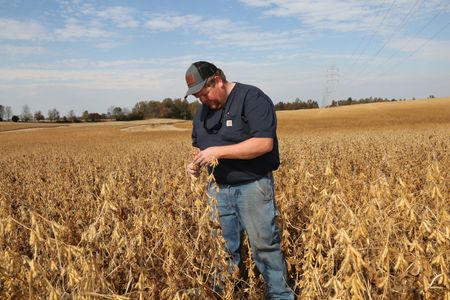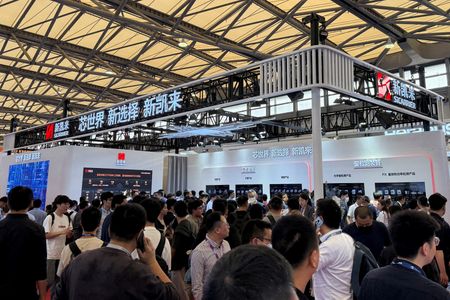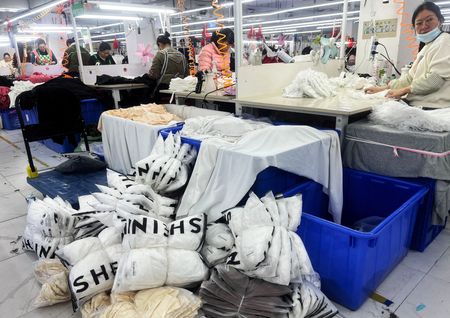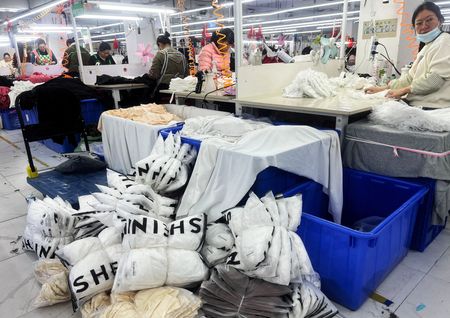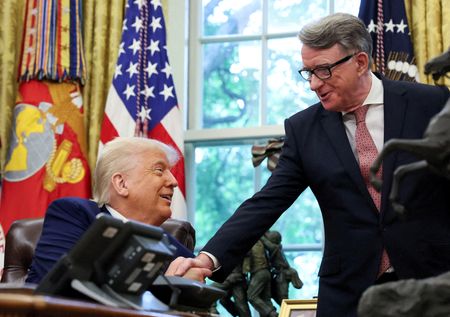By Tom Polansek
CHICAGO (Reuters) – A surprising tariff pause between Beijing and Washington will not help U.S. farmers revive soy sales in China without additional concessions, producers said, because top-supplier Brazil still has a competitive price advantage.
Under the truce announced on Monday, the United States will cut extra tariffs it imposed on Chinese imports to 30% from 145% for the next three months, while Chinese duties on U.S. imports will fall to 10% from 125%.
Soybean export premiums fell in Brazil while U.S. futures prices hit a three-month high on the de-escalation, reflecting expectations that China could buy more from the U.S.
But American farmers said the tariff pause isn’t enough. Brazil, the biggest soy supplier to China, has ample supplies from a record harvest, lower prices, and its farmers do not face the Chinese tariff that U.S. competitors do. China, the world’s largest crop importer, already sources roughly 70% of its soybean imports from Brazil.
“The tariff that remains in place for U.S. soy is far from inconsequential,” said Caleb Ragland, a farmer in Magnolia, Kentucky, and president of the American Soybean Association.
“Products purchased from our competitors in Brazil and Argentina are not burdened with this extra cost.”
While the United States in 2022/23 accounted for about 28% of China’s soybean imports, it has been a critical market for U.S. farmers, representing more than half of U.S. soybean exports in the most recent marketing year.
President Donald Trump’s trade war has hurt sales of American soybeans, sorghum and pork products to China and created a new opportunity for Brazil.
Brazil aims to export even more agricultural goods to China, including sorghum, pork and chicken, and seize market share, said Luis Rua, who oversees foreign trade for Brazil’s Ministry of Agriculture.
“What they (China) will buy is what they barely need to get by,” Dan Henebry, a corn and soy grower in Buffalo, Illinois, said. “If South America is short… they’ll buy from us.”
Chinese buyers have also avoided U.S. wheat and bought 400,000 to 500,000 metric tons from Australia and Canada in recent weeks, traders said.
U.S. farmers hope China may buy American farm goods as part of trade negotiations. However, Chinese importers will be reluctant to book large purchases because of remaining trade barriers and uncertainty over what will happen when the pause expires, said Even Rogers Pay, agriculture analyst at Trivium China.
“There are a few things stacked up against this trade war ceasefire being a boon for farmers,” Pay said.
U.S. pork exported to China still faces a minimum total tariff rate of 57% during the pause, according to the National Pork Producers Council
The pause is set to expire just before U.S. farmers begin harvesting soybeans and corn at the start of their new marketing season, an important time for exports. They planted fewer soybeans this spring than last year because the crop looked less profitable than corn.
“If negotiations break down, buyers risk losses when cargoes arrive during the U.S. soybean marketing season,” a China-based soy crusher said. “It’s just not worth the gamble.”
The truce did little to address underlying issues that led to the dispute, including the U.S. trade deficit with China.
Beijing did not fulfill commitments to buy more U.S. agricultural products under a trade deal it struck with Trump during his first term in 2020.
“The situation was bad before we started, and something needed to be done. The situation is still bad,” said Ron Heck, a corn and soy farmer in Perry, Iowa.
At the time, China had slashed U.S. crop purchases, prompting Trump’s administration to pay farmers billions of dollars in aid.
“It doesn’t appear that we solved anything after that turmoil,” said Henebry. “We’re right back at the baseball plate trying to see if we’re going to hit a home run or strike out again.”
(Reporting by Tom Polansek in Chicago; Additional reporting by Julie Ingwersen in Chicago and Ella Cao in Beijing; Editing by Cynthia Osterman and Deepa Babington)

